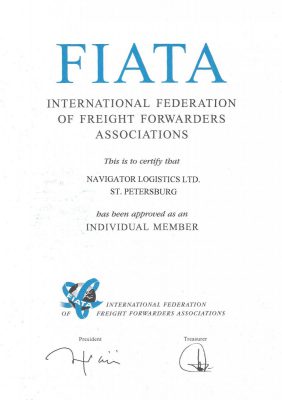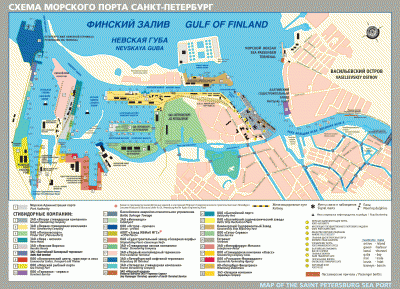To dispatch goods from any sea port of the world, it’s necessary to perform the whole complex of works beginning from execution of documentation and delivery of the cargo to the territory of port. Then the cargo is often required to be placed somewhere for temporary storage waiting for the shipload lot of the goods to be formed, then it is necessary to go through the customs procedures, to load the cargo onto the ship, to contact a stevedoring company. At the same time it is necessary to use services of port specialists such as tallymen, surveyors, adjusters for different operations. To receive goods it’s also necessary to use efforts before they leave the territory of the port.
The whole complex of cargo handling operations in the port is called in-port cargo forwarding. Good organization of this forwarding can significantly reduce the time of cargo presence in the port and thus to reduce transportation expenses and expenses for storage of cargo in the port.
As a rule, ports are well-organized mechanisms where every employee knows his place and performs his duties precisely. And at first thought, in-port forwarding tasks seem quite simple in such conditions. However, the complete list of operations within its framework can reach several tens, and the operations differ not only from port to port, but also from one berth to another, from terminal to terminal on the territory of one port. This is due to diversity of cargoes, difference of transportation conditions and customs of ports, different needs of cargo owners. Only a freight forwarder who has sufficient experience in solving any problem of this variety and works constantly with cargoes can know all these nuances.
Delivery of cargoes to the port and their export from the port are external tasks with regard to in-port forwarding, however, they are closely related to it. Because delivery of cargoes to the port is carried out only after conclusion of the contract of in-port forwarding – taking into account the standards of treatment of technical means by the terminal of the port and norms of technological accumulation of cargoes of certain type. And terms of cargo export determined by the same contract also depend on the technological capabilities of the terminal.
An in-port freight forwarder can be represented by an independent company or by an agent of liner carrier, or forwarding can be performed directly by employees of the terminal. But in our opinion, the most acceptable solution is a scheme where responsibility for in-port forwarding is placed on a forwarder – an operator of multimodal transportation. Because this eliminates possible duplication of responsibilities of in-port and multimodal freight forwarders related to the organization of various approvals or resorting to, for example, surveyor or customs services. In this case a multimodal operator just adds to his regular duties the full complex of services concerning cargo transhipment via the port.
Navigator Logistic Company provides its clients under the contract of cargo delivery the entire set of services of cargo handling in the sea port of Saint-Petersburg. We work with all necessary documents, carry out all loading and unloading operations, repacking and transshipment of cargoes in the port, arrange all necessary inspections by all state licensing authorities, and engage services of tallymen and surveyors. Please contact our specialists and they will consult you in the matters of in-port forwarding and preparation of respective documents.

